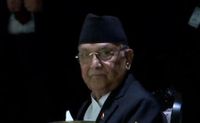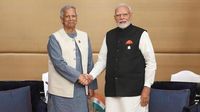NEW DELHI: In a significant diplomatic shift, India has revoked a crucial trans-shipment facility that allowed Bangladesh to export cargo through Indian territory to third countries. This decision, announced on April 8, 2025, comes just days after Bangladesh’s Chief Adviser, Muhammad Yunus, made controversial remarks about India’s Northeast region during a visit to China.
The trans-shipment facility, which had been in place since June 2020, enabled Bangladesh to route its exports to countries such as Bhutan, Nepal, and Myanmar via Indian Land Customs Stations (LCSs). The recent circular from the Central Board of Indirect Taxes and Customs (CBIC) stated, "It has been decided to rescind... circular...dated June 29, 2020, as amended with immediate effect. Cargo already entered into India may be allowed to exit the Indian territory as per the procedure." This move is seen as a response to Yunus's comments, where he described India’s northeastern states as a "landlocked" region reliant on Bangladesh for maritime access.
Yunus's remarks, made during a high-profile roundtable in Beijing, portrayed Bangladesh as the "only guardian of the ocean" for India’s Northeast, which he claimed had no direct access to the sea. He invited China to deepen its economic involvement in the region, suggesting that this could be an extension of the Chinese economy. This statement provoked a swift backlash from Indian officials, including External Affairs Minister S. Jaishankar, who emphasized India’s strategic maritime capabilities and connectivity initiatives.
"We have the longest coastline in the Bay of Bengal... Our North-Eastern region is emerging as a connectivity hub for BIMSTEC," Jaishankar stated, underscoring India's role in regional trade and cooperation. The Ministry of External Affairs also highlighted that the trans-shipment facility had led to significant congestion at Indian airports and ports, hindering the efficiency of Indian exports.
Indian exporters, particularly in the apparel sector, had long criticized the trans-shipment arrangement, claiming it caused logistical challenges. Sudhir Sekhri, Chairman of the Apparel Export Promotion Council (AEPC), noted that 20 to 30 Bangladeshi trucks arrived daily in Delhi, contributing to congestion and increased freight costs. "Now we will have more air capacity for our cargo," said Ajay Sahai, Director General of the Federation of Indian Export Organisations (FIEO), pointing out that the previous arrangement had reduced space for Indian exporters.
Trade experts warned that the cancellation of the trans-shipment facility would adversely affect Bangladesh’s export logistics. Ajay Srivastava, founder of the Global Trade Research Initiative, stated, "The previous mechanism had offered a streamlined route through India, cutting transit time and cost. Now, without it, Bangladeshi exporters may face delays, higher costs, and uncertainty." He also cautioned that the withdrawal could raise concerns regarding transit rights under World Trade Organization (WTO) rules, particularly for landlocked nations like Nepal and Bhutan.
The backdrop of this diplomatic tension is a broader context of rising trade tensions in the region, particularly with the United States imposing new tariffs on both India and Bangladesh. The India-Bangladesh trade relationship, which stood at approximately $12.9 billion in 2023-24, is now facing additional strains as both countries navigate complex geopolitical dynamics.
Yunus's comments and the subsequent Indian response come at a time when relations between the two nations have already been strained. Since the interim government took power in Bangladesh, there have been rising concerns in India regarding the treatment of minorities in Bangladesh and the overall stability of the Bangladeshi government. The diplomatic fallout from Yunus's statements has prompted calls for a reevaluation of bilateral relations, with Indian leaders urging a more cautious approach to rhetoric that could exacerbate tensions.
As the situation develops, observers are closely monitoring the implications of India’s decision to withdraw the trans-shipment facility. The immediate impact will likely be felt in Bangladesh's export logistics, which relied heavily on the Indian infrastructure for trade with third countries. Meanwhile, Indian exporters may see a temporary relief in logistical pressures but will need to adapt to the changing trade landscape.
In summary, India’s withdrawal of the trans-shipment facility underscores the fragile nature of India-Bangladesh relations, highlighting how diplomatic comments can swiftly escalate into significant policy shifts. The future of trade between the two countries will depend on how both governments navigate these complex issues and whether they can find common ground amid rising geopolitical tensions.








